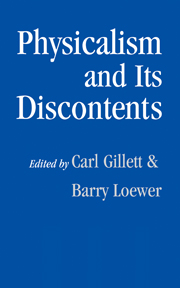Book contents
- Frontmatter
- Contents
- Contributors
- Preface
- Part I Physicalism
- 1 The Rise of Physicalism
- 2 From Physics to Physicalism
- 3 Sufficiency Claims and Physicalism: A Formulation
- 4 Realization and Mental Causation
- 5 Physicalism and Psychology: A Plea for a Substantive Philosophy of Mind
- 6 Davidson and Nonreductive Materialism: A Tale of Two Cultures
- 7 Substance Physicalism
- 8 Possibility: Physical and Metaphysical
- Part II Physicalist Discontents
- Part III Physicalism and Consciousness: A Continuing Dialectic
- References
- Index
6 - Davidson and Nonreductive Materialism: A Tale of Two Cultures
Published online by Cambridge University Press: 02 November 2009
- Frontmatter
- Contents
- Contributors
- Preface
- Part I Physicalism
- 1 The Rise of Physicalism
- 2 From Physics to Physicalism
- 3 Sufficiency Claims and Physicalism: A Formulation
- 4 Realization and Mental Causation
- 5 Physicalism and Psychology: A Plea for a Substantive Philosophy of Mind
- 6 Davidson and Nonreductive Materialism: A Tale of Two Cultures
- 7 Substance Physicalism
- 8 Possibility: Physical and Metaphysical
- Part II Physicalist Discontents
- Part III Physicalism and Consciousness: A Continuing Dialectic
- References
- Index
Summary
I shall argue in this chapter that the discussion of nonreductive materialism has been conducted under the shadow of an ambiguity in the sense of reductive. One sense is specific to the philosophy of mind, and here the reductive tradition is marked by the attempt to give an account of the mind in behavioral or functional terms, without remainder. The other sense derives from the philosophy of science, and it concerns the possibility of giving some kind of systematic account of “higher” sciences in terms of “lower” ones, and, ultimately, in terms of physics. I shall argue that failure to distinguish these senses in Davidson's “Mental Events” has led to serious confusions in the discussion of “nonreductive materialism” and in the attendant notion of ‘supervenience.’ Davidson has clarified the confusion in “Mental Causes”, but in a way that makes his original contribution much less interesting than it had seemed to be. In the course of the discussion, I hope to clarify the various senses in which theories, properties, and predicates can be ‘reduced’ or ‘emergent.’
Story 1. In order to vindicate a materialist theory of the mind it is necessary to show how something that is a purely physical object can satisfy psychological predicates. Those features of the mind which seem to be, prima facie, incompatible with this physicalism – such as consciousness and the intentionality of thought – must, therefore, be explained in a way that purges them of their apparently Cartesian elements, which would be incompatible with materialism.
- Type
- Chapter
- Information
- Physicalism and its Discontents , pp. 129 - 151Publisher: Cambridge University PressPrint publication year: 2001



